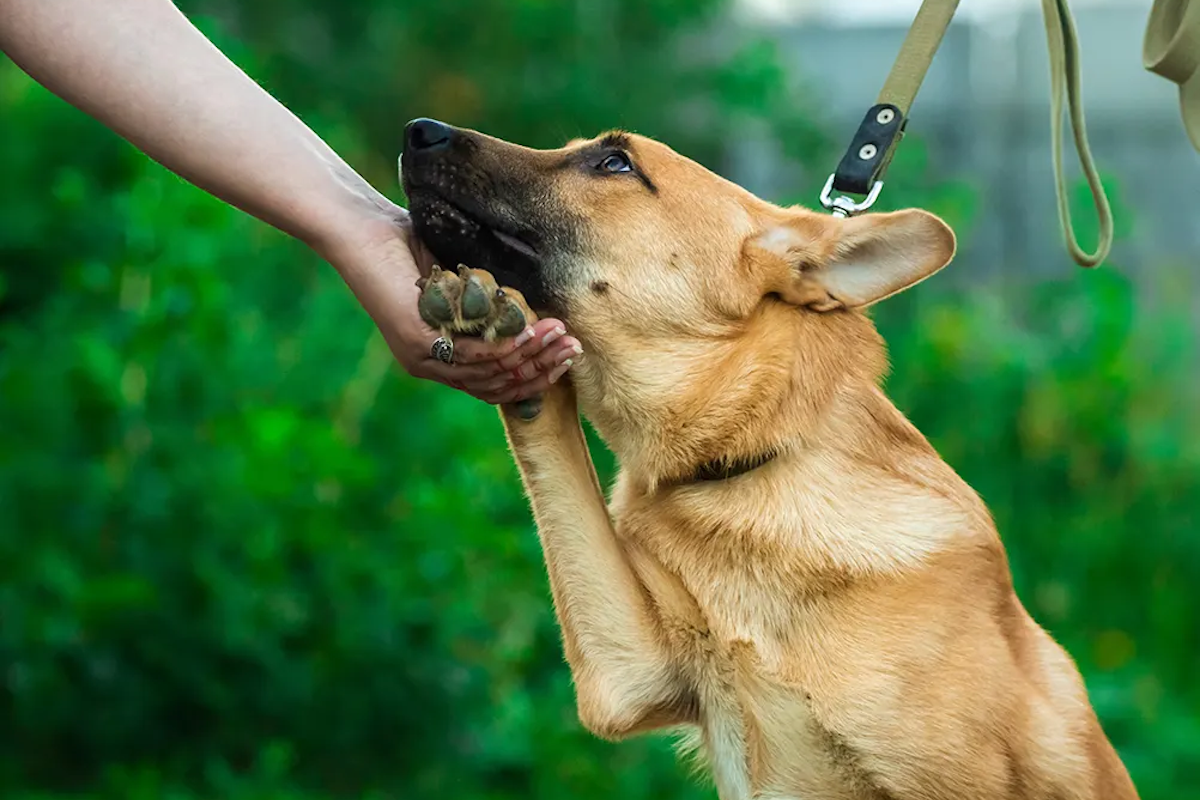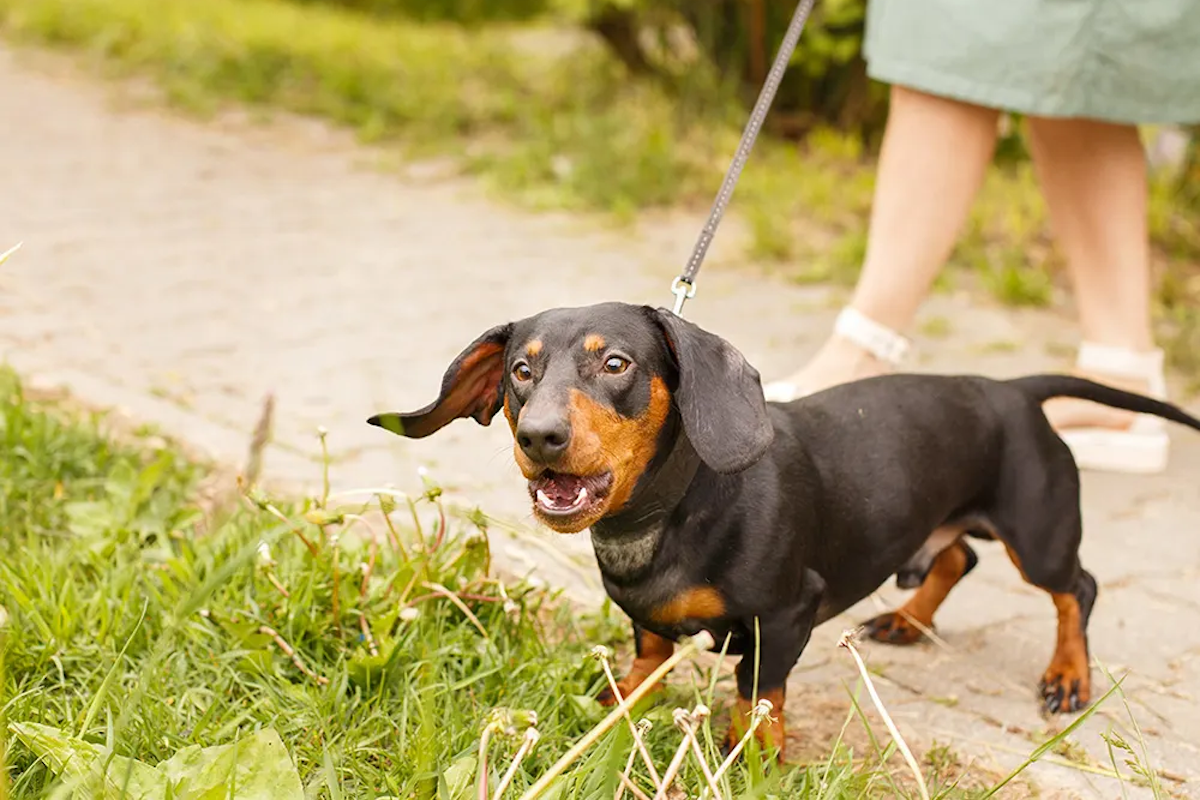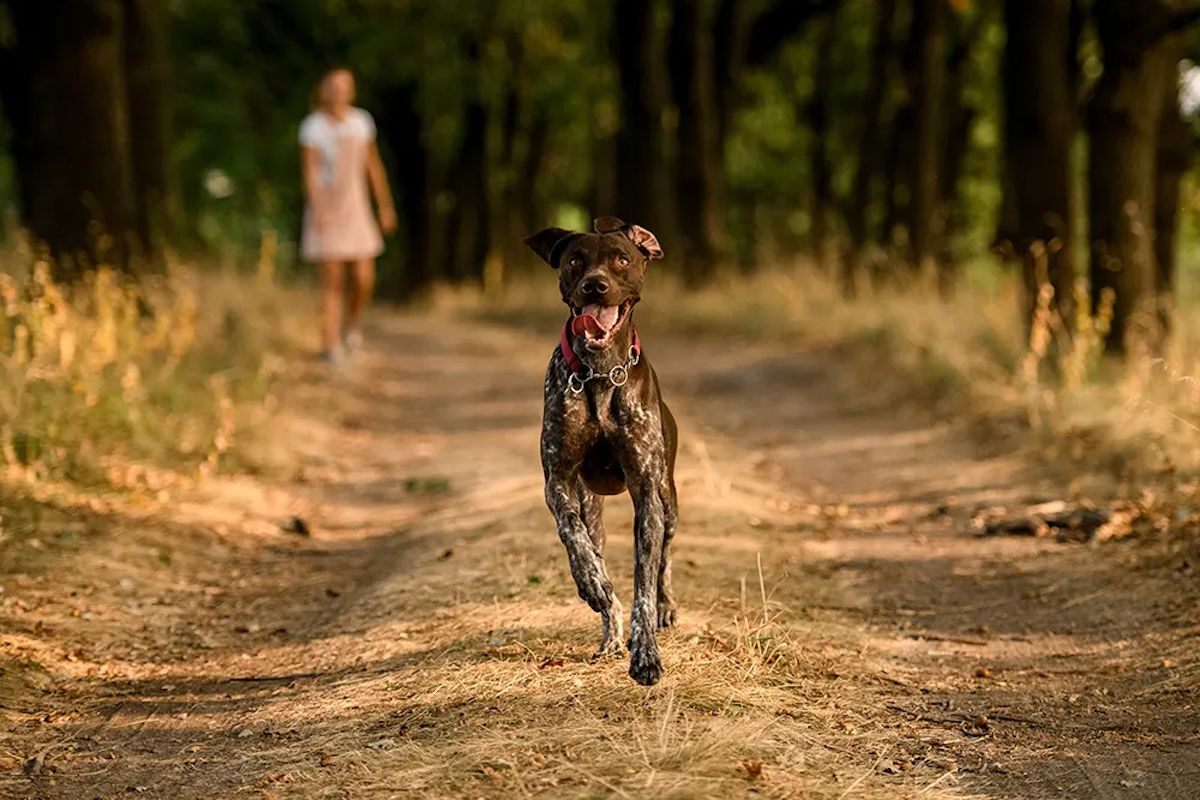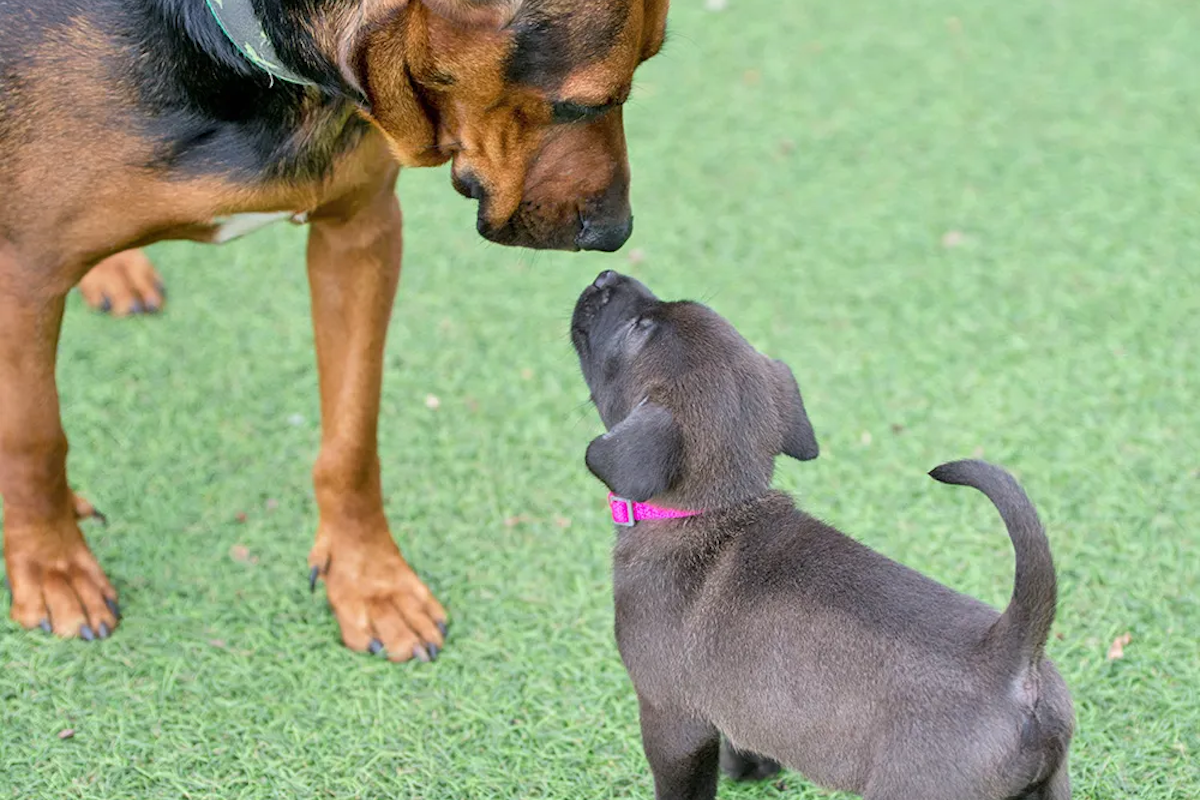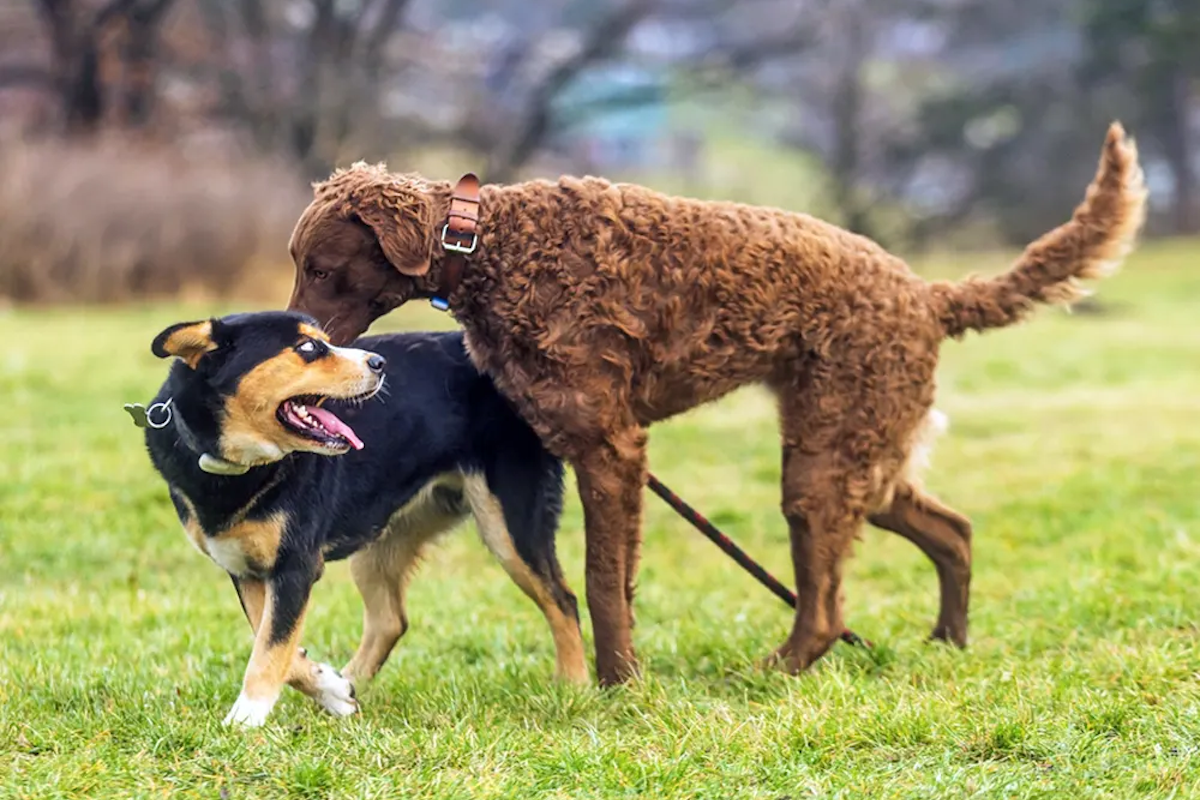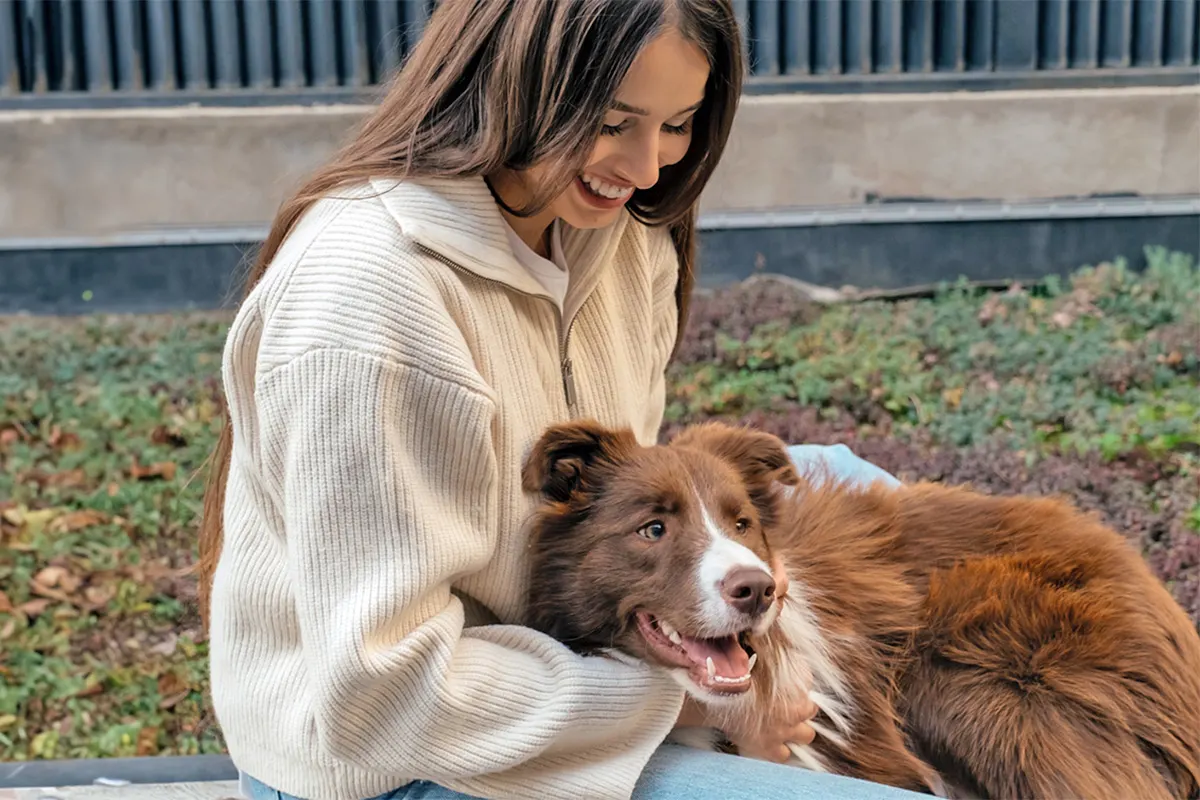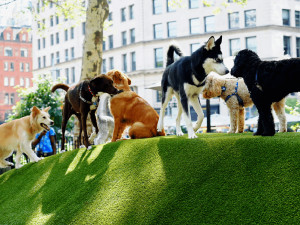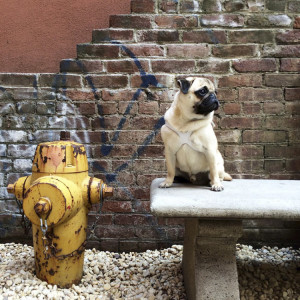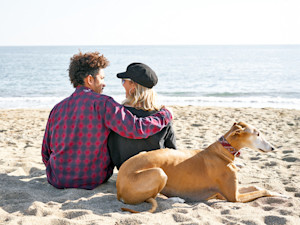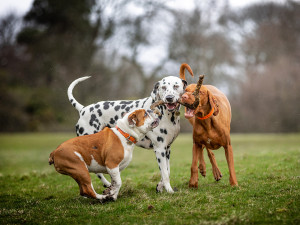12 Signs You Shouldn’t Take Your Dog to the Dog Park
Just like not every person is into Coachella, not every pup wants to play in a crowd of dogs.
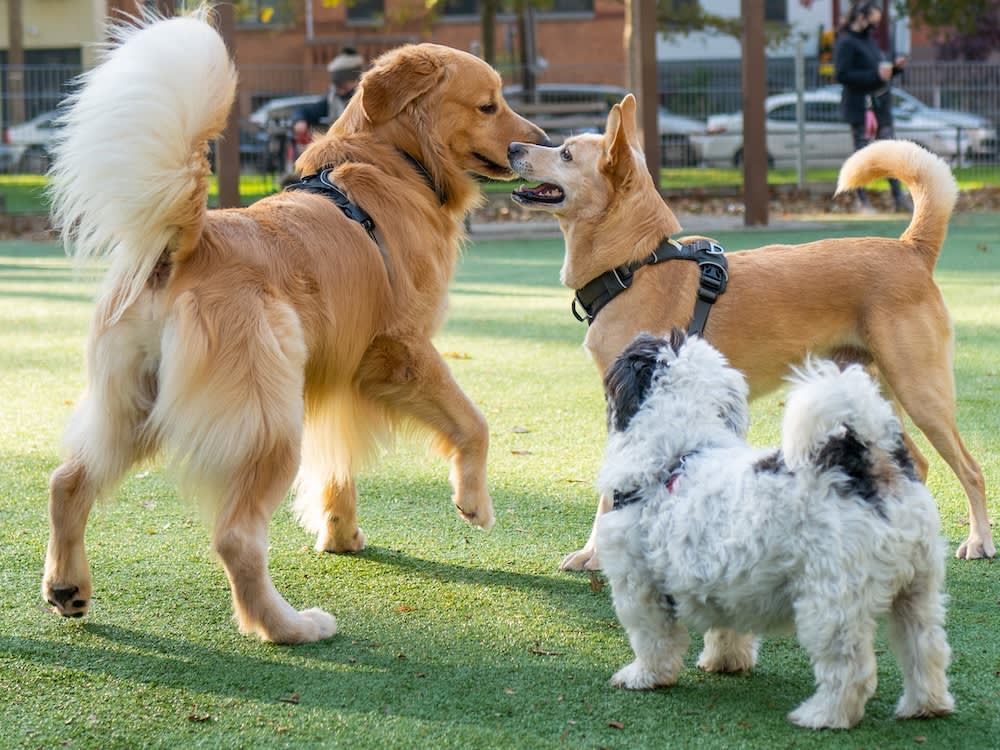
Share Article
I’ve never had a dog who’s been a fan of the dog park, though I’ve tried: My introverted Cocker Spaniel repeatedly sought shelter beneath a bench; my outgoing Yorkie burst into the park like a little hero but within minutes was scratching at my leg to get into my lap; and my anxious Terrier-Schnauzer mix scurried to the sidelines, finally taking refuge behind a tree.
In all cases, after a couple of times, we didn’t go back. While they all seemed to enjoy meeting and sniffing other dogs on their leashed walks, the dog park — wild and free — must have seemed as lawless as the Wild West, a canine world of too much possibility and uncertainty.
“Dog parks are high-energy, unpredictable environments that not all dogs enjoy or thrive in,” says Dyanna Durr, a certified veterinary technician and the south Atlantic regional technician director at VCA Animal Hospitalsopens in new tab.
While some dogs seem to prosper in such an environment, the same way some humans adore the chaos of Coachella or Burning Man, not all pups love busyness, crowds, and unpredictability.

“It’s worth thinking about whether your dog is really going to enjoy the chaos that goes on at a dog park,” says Petrina Firthopens in new tab, a certified canine behaviorist and dog trainer at The Pet Coachopens in new tab. “If they have nowhere to get away from dogs who are bothering them, then dog parks can do more harm than good.”
Most experts agree that the dog park isn’t always a good idea for our pups, and in some cases, it can even be dangerous. Here are some signs it’s a miss for your dog.
Your dog is naturally anxious.
Some pet parents might think that taking a shy or nervous canine to the dog park could be a good way to get them to come out of their shell.
That’s not always so, Firth says. “Shy or anxious dogs can easily get bullied by more rambunctious dogs,” she says, and that can do a lot of damage emotionally, making them even more fearful of interactions.
Durr says if you see your dog doing the following things, you should leave:
Cowering
Trying to escape
Freezing
Keeping their head down
Constantly licking their lips
Firth recommends a less intimidating way for helping them to make friends.
“While dog-dog play can give an anxious dog a lot of confidence, you need to carefully match them, and I’d recommend if you have a dog who is anxious about other dogs that you go for walks with a calmer adult dog who isn’t going to pressure your anxious dog,” she notes.
There are rumors about dangerous dogs.
When you’re out and about with your dog, it’s easy to not think the worst. But dangerous-dog laws exist for a reason, and sometimes there are pups who just don’t get along with other canines.
Lots of communities have dog groups online — try Facebook or Nextdoor — that give pet parents a heads up about goings-on in the neighborhood, so you’re likely to hear if bad stuff is going down at your local dog park.
While dogs are obviously perfect angels, it doesn’t mean that they weren’t once wild animals with still-intact innate instincts, and that means that dogs who’ve been mistreated or had a rough past might not be ready to socialize. When their pet parents ignore this fact, they may see some negative effects.
Your dog is reactive.
As a pet parent, it’s up to you to be the best you can be. If your pup doesn’t keep their chill around other dogs, do yourself (and other pups) a favor, and find better, healthier outlets for their exercise and socialization.
“Dog parks are meant for confident, dog-social adult dogs,” says Tatiana Yastremskiopens in new tab, a certified dog trainer and canine behavior consultant at St. Hubert’s Animal Welfare Centeropens in new tab in Madison, New Jersey. “It’s unfortunate, however, [that] there are dogs that frequent dog parks that really shouldn’t be, because they lack sociability toward other dogs, are disinterested or afraid to interact with other dogs, or show downright aggression to other dogs.”
Durr says the following signs may signal reactivity:
“Play” biting or mouthing
Excessively mounting other dogs
Ignoring other dogs’ signals to stop
“Dog parks are unpredictable environments with lots of stimuli,” she adds. “A reactive dog may become overwhelmed and lash out, putting themselves and others at risk.”
It doesn’t mean your reactive pup doesn’t deserve to have fun, but it’s your job to find them the perfect activity that’s right for them.
Other pet parents aren’t following the rules.
It would be lovely to think that all pet parents have the same amount of courtesy, but if you’ve ever seen a dog mom or dad slink away sneakily after leaving their dog’s poop on the sidewalk, you’ll know that not everyone possesses the same level of thoughtfulness.
So it goes at the dog park. If you notice a dog not following the rules and their pet parent isn’t correcting the situation, head out before things escalate.
Your dog has poor recall.
No one’s perfect, and some dogs are a little independent-minded and could require a bit more training. But if your dog doesn’t want to come when called, then it’s best to skip the dog park until they earn an A-Plus in manners (don’t worry, they’re still an angel, even if their etiquette’s a little rusty).
“If your dog doesn’t reliably come when called or follow basic cues, it’s hard to keep them safe or prevent conflicts,” Durr says.
Your pup isn’t spayed or neutered.
Science has shown that there are lots of benefits to spaying and neuteringopens in new tab your dog — in addition to the fact that you won’t accidentally contribute to the pet overpopulation problem. That said, if there’s a reason your dog isn’t spayed or neutered yet, skip the dog park.
Your dog is a senior.
Imagine if someone tried to throw you into the chaos of a middle school field trip, trapped on a bus with tweens throwing food, playing loud music, and shoving TikToks in your face. You’ve aged out of that (thank God), and senior dogs might age out of the dog park — with all its antics.
“As their joints become stiffer, they may not enjoy romping around with young whipper snappers who love to wrestle and spar with each other to no end,” Yastremski says.
Even dogs who used to love the dog park may age out of it. “Dogs may also become more selective in their friendships with other dogs as they age,” she adds. (We’re pretty sure this is true for people, too.)
Your dog is a puppy.
Your puppy is a masterpiece poised to be the best-behaved little canine kiddo you’ve ever met, but the dog park could ruin this. “If your dog is a puppy or just entering adolescence, they are not a good fit for dog parks,” Yastremski says.
In fact, the dog park could turn that sweet, innocent pup into a bully — or make them feel bullied.
“Dogs often learn good and bad behavior from other dogs, so they can pick up inappropriate play styles or feel like they need to defend themselves,” Firth says. She notes that puppies are highly impressionable and often don’t need much encouragement to play rough.
“You don’t want to be known as the one with the dog who can’t play nicely, but if your puppy is constantly playing rough with other dogs at a dog park from a young age, they can develop a bit of a reputation,” Firth notes.
Yastremski adds that just one bad experience for your puppy can turn into “a lifetime of behavioral issues, such as leash reactivity, or fear of or aggression to other dogs. Socializing puppies with other dogs needs to be a very positive experience for a puppy. Your puppy is not guaranteed to have that kind of experience at a dog park.”
Your dog is unvaccinated.
It’s not worth compromising your dog’s health just for a few minutes (or even hours) of fun, and most puppies, in particular, aren’t fully vaccinated until they’re about 16 weeks old.
“Depending on age, puppies don’t have all of the vaccines necessary to ward off infectious diseases,” Yastremski says. “Additionally, puppy tummies are very sensitive, so contracting an intestinal parasiteopens in new tab could possibly become life-threatening.”
Highly contagious parvovirus should be a concern for most pet parents, but kennel cough and other diseases are also a concern for pups who aren’t up to date on their vaccines and other meds.
Your dog is humping everyone (or keeps getting humped) .
Ah, love. That’s what we humans might think when we see a dog trying to hump another dog at the park: They’ve found another pup they really, really like. Not necessarily, Firth says.
“So often people laugh and think the dogs are ‘getting it on’ when really it’s commonly a sign of overstimulation and stress,” Firth explains. If your dog’s doing this repeatedly, it could be a sign that they’re not a great fit for groups and need more of a one-on-one friendship with another pup.
Your dog keeps checking in with you.
It’s cute when your pup runs back to say hello to you in the midst of playing with their “friends,” but this action can be deceiving. They might actually feel like they’re being bullied.
“Dogs who keep checking in with their owners are often looking for help and support, and we should step in and see if they need us to break things up,” Firth says. “Dogs who go back for more may not be enjoying the situation but feel the need to keep going back to defend themselves.”
Your dog is a people person… er, people pup.
Some people prefer the company of dogs to humans (raises hand), and some dogs prefer the company of people to other pups. If your dog doesn’t particularly enjoy hanging around other pups in a one-on-one situation, why subject them to a full-on pooch party?
“There are dogs out there who really don’t enjoy the company of other dogs,” Yastremski says, noting that it can stem from a variety of reasons, including bad experiences or just a personal preference.
“Not every dog is a ‘dog park’ dog, and there are many dogs out there who prefer humans to dogs as friends,” Yastremski says. “And that is OK!”
When should you leave the party, aka the dog park?
Eventually, it’s time to head out, even if everyone’s had a good time. Here are some warning signs that signal you should head out — even if your pup’s a dog park regular. You should leave if:
Your dog is trying to escape, hiding, or seeking attention from you.
You notice someone not controlling their dog.
A dog is being reactive.
You feel uncomfortable for any reason—trust your gut!
In any case, Firth recommends learning how to break up a fightopens in new tab if it happens.
And keep in mind that there are lots of ways for your dog to enjoy the world that don’t involve dog parks. “Many dogs are better suited to structured playdates, walks, or enrichment activities at home,�” Durr says.
Some alternatives to dog parks include:
A calm walk with a similarly tempered pup
A well-vetted doggie daycare
Training or agility classes
One-on-one playdates
Sniff walks alone or with other dogs
So, the next time you show up at the dog park, pay attention to your dog’s vibe: Is their face giving Why did you just throw me into a ring with a dozen unhinged four-legged lunatics? If so, immediately exit, kindly apologize to your pup, then take them for a calmer walk, somewhere they can casually stroll in the soft grass, hear the pleasant chirp of birds, and take time to smell the roses.
Lest your pup end up like this little pup, who might as well be Bridget Jones sitting on her sofa alone with vodka, singing “All By Myself”:

Marti Trgovich
Marti Trgovich is a writer specializing in pets and wildlife. She has written about animals for National Geographic, The Washington Post, Newsweek, and other publications, and she spent nearly a decade as an editor at The Dodo. Her favorite animals are guinea pigs, sheep, and small, saucy senior dogs.
Related articles
![dogs at dog park drinking water and playing in pool]()
Dog Park Etiquette: Dog Park Dos and Don’ts
New kid on the block? Follow this trainer’s tips before letting your pet run wild.
![A pug sitting on a bench outside next to a fire hydrant.]()
6 Private Dog Parks for NYC’s Slobbery Social Elite
New York’s hottest clubs are members-only dog runs.
![Woman holding her beagle outside in the grass.]()
How to Deal With All the Drama at the Dog Park
In the end, some jerks are just better to avoid. But it’s worth trying to resolve things first.
![Couple sitting on the beach with a dog behind them.]()
8 Signs Your Dog Is an Introvert
Not all pups are socialites.
Are Dog Parks Good for Socialization?
Help! Should I take my young dog to the dog park for “socialization”?
Is It Weird to Go to a Dog Park If You Don’t Have a Dog?
Dog-watching is one of the best ways to pass time, even if you don’t have a pup. But will dog parents judge you?
